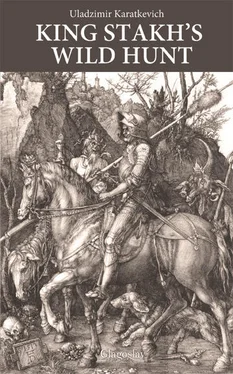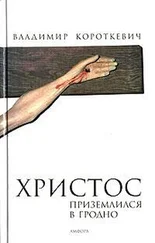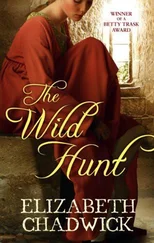And then I, having succeeded in reloading my revolver, sent all the six bullets into him. Varona, grasping at the air with his hands, reeled in his saddle, but nevertheless turned his horse around, knocked the high-cheek-boned man to the ground and dashed off in the direction of the swamp. He was all the time grasping at the air with his hands, but stayed in the saddie and together with it (the saddle-girth must have broken) slid down the side until he was hanging over the ground. The horse turned aside. Varona's head struck heavily against a stone post in the fence.
Varona flew out of his saddle, struck against the ground and remained lying motionless, dead.
It was a crushing defeat. The terrible Wild Hunt was overcome by the hands of ordinary mužyks on the very first day that they exerted themselves a little and began to believe that with pitchforks they could rise even against phantoms.
I examined the battlefield. The peasants were leading the horses off to the side. They were real Paleśsie drygants. All striped and with spots, with white nostrils, with eyes in whose depths a red flame blazed. Not surprising then that their capering in the fog seemed so unnatural, for I knew that this breed was distinguished for its remarkably long strides.
And unexpectedly two more riddles were solved. Firstly, four sheepskin bags hung at the saddle of each of the hunters. In case of need they could be put on the horses' hoofs and tied at the pasterns. Their steps became entirely noiseless. Secondly, among the dead and the wounded I saw three scarecrows on the ground that were dressed like the hunters, but they were tied to their saddles with ropes. Evidently, Varona did not have enough people.
However, our losses were also heavy ones. We'd never have conquered this band of professional murderers if our attack had not been so unexpected. But even as it was, our results were bad: the mužyks just could not fight. The fellow with the prominent cheek-bones who was knocked down by Varona's horse, lay with his head smashed. The long-legged mužyk had a bullet hole darkening in the very middle of his forehead. The mužyk with the club lay on the ground, his feet jerking: he was dying. Of the wounded there were twice as many. I also received a wound. A bullet at the rebound had flicked me in the back of my head.
We were swearing: Michał was bandaging my head and I was screaming that it was a trifle, rubbish. Soon one man was found alive among the Hunters, and he was led to a blazing camp-fire. In front of me stood Mark Stachievič, his hand hanging down at his side like a whip. It was that very same young aristocrat whose conversation with Pacuk I had overheard sitting in the tree. He looked very colourful in his cherry-coloured chuga, in a little hat, with an empty sabre scabbard at his side. “It seems you threatened the mužyks, didn't you, Stachievič? You will die as these here,” I said calmly. “But we can let you go free, because, alone, you are not dangerous. You will depart from the Janoŭski region and will remain alive, if you tell us about all the foul deeds of your gang.”
He hesitated, looked at the severe faces of the mužyks, the crimson light of the camp-fire lighting up their faces, their leather-coats, their hands gripping their pitchforks, and he understood there was no mercy to be expected. Pitchforks from all sides were surrounding him, touching his body.
“Dubatoŭk is to blame — it's all his doings,” he said sullenly. “Janoŭskaja's castle was to have been inherited by Haraburda, but he was greatly in debt to Dubatoŭk. Nobody, except us, Dubatoŭk's people, knew about that. We drank at his place and he gave us money. While himself he dreamed of the castle. He did not want to sell anything from that place, although the castle cost a lot of money. Varona said that if all the things in the castle were sold to museums, thousands could be realized. A chance event brought them together. At first Varona did not want to kill Janoŭskaja even though she had refused to marry him. But after Śvieciłovič't appearance, he agreed. The tale about King Stach's Wild Hunt came into Dubatoŭk's head three years ago. Dubatoŭk has hidden money laid aside somewhere, although he seems to be living poorly. In general he is a liar, very sly and secretive. He can twist the cleverest man round his little finger, he can pretend to be such a bear you'd be at a loss what to think. And so he went to the best of stud farms, owned by a lord who had become impoverished in recent years, and bought all his drygants. Then he brought them to the Janoŭski Reserve where we built a hide-out for ourselves and a stable. Our ability to tear along through the quagmire, where nobody can even walk, surprised everybody. But nobody knows how long we crept along the Giant's Gap in search of secret paths. And we found them. And studied them. And taught the horses. And then we dashed through places where the paths were up to the elbow in the quagmire, but at the sides — impassable marsh land. And the horses are a miracle! They rush to Dubatoŭk's call as dogs do. They sense the quagmire, and when a path breaks off, they can make enormous leaps. And we always went on the hunt only at night, when fog creeps over the land. And that's why everyone considered us phantoms. And we always kept silent. It was risky. But what could we do: die of hunger on a tiny piece of land? And Dubatoŭk paid. And we were not only driving Janoŭskaja to madness or death, but we even put the fear of God into those impudent serfs and taught them not to have too high an opinion of themselves. It was Dubatoŭk who got Haraburda to force Kulša to invite the little girl, because he knew that her father would be anxious about her. And we intercepted Raman on the way and seized him. Oh! And what a chase it was! — Ran away like the devil... But his horse broke a leg.”
“We know that,” I observed caustically. “By the way, Raman did give you away precisely after his death, although you didn't believe his cries. And some days ago you still didn't believe it when you were speaking with Pacuk after Bierman's murder.”
Stachievič was so surprised his jaw fell. I ordered him to continue relating.
“We inspired fear everywhere in the region. The farm-hands agreed to the price the owners gave. We began to live better. And we led Janoŭskaja to despair. And then you appeared. Dubatoŭk's bringing the portrait of Raman the Elder was no accident. If not for you, she would have gone mad within a week. Dubatoŭk saw that he had made a mistake. She was merry and carefree. You were dancing with her all the time; Dubatoŭk especially invited you when the guardian's report on affairs was to be made, and his guardianship handed over, so that you should become convinced she was poor. He conducted the estate well — it was, you see, to be his future estate. But Janoŭskaja's poverty had no effect on you, and then they decided to get you out of the way.”
“By the way,” I said, “I never had any intention of marrying her.”
Stachievič was totally surprised.
“Well, never mind. All the same you interfered with us. She revived with you there. To be just, I must say that Dubatoŭk really loved Janoŭskaja. He did not want to kill her, and if he could have got along without doing that, he would have willingly agreed. He respected you. He always said to us that you were a real man, only it was a pity that you didn't agree to join us. In short, things became too complicated: we had to get rid of you and of Śvieciłovič who had the right to the inheritance and loved Janoŭskaja. Dubatoŭk invited you to his place, where Varona was to challenge you to a duel. He played his part so well that no one even suspected that it was Dubatoŭk, not Varona, who was the instigator, and we in the meantime studied you closely, because we had to remember your face.”
Читать дальше



